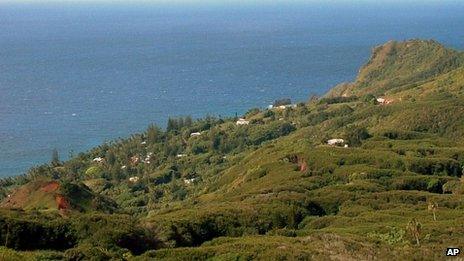UK 'not protecting' biodiversity in overseas territories
- Published

Inhabitants of the Pitcairn Islands want to set up a marine protection area
The UK is failing adequately to protect "unique" animal and plant species in its overseas territories, MPs say.
The Environmental Audit Committee said, external the UK was responsible for endangered species and significant habitats in 14 locations, including Bermuda, Anguilla Gibraltar and the Falkland Islands.
But these had not been fully "assessed and catalogued", and the UK's approach was based on "vague aspirations".
Wildlife groups say the government must significantly raise spending in them.
According to the committee, the 14 overseas territories for which the UK is responsible contain vast tracts of ocean, thousands of coral atolls, tropical forests and a polar wilderness six times the size of the UK.
They contain at least 517 globally threatened species as well as undisturbed habitats of international significance.
'Devolving responsibility'
But the MPs warn that these are at risk of "immediate and significant threats" from invasive species, under-regulated development and climate change.
Although the UK had sub-contracted environmental management to the authorities in the inhabited territories, the committee said this "cannot devolve away the UK's ultimate responsibility under international law".
It is calling on ministers to work with local officials on the islands concerned to promote sustainable tourism and planning regimes.
"The natural environment in the overseas territories is incredibly diverse, but it is currently under-protected," Joan Walley, the Labour MP who chairs the body, said.
"The UK government doesn't even know precisely what it is responsible for, because it has failed accurately to assess and catalogue those species and habitats."
'Soft power'
In particular, she said, the UK must back the 50 inhabitants of the Pitcairn Islands in their efforts to establish a fully marine-protected area around the islands.
She added: "During our inquiry, the UK government expressed vague aspirations to 'cherish' the environment in the overseas territories, but it was unwilling to acknowledge or to address its responsibilities under United Nations treaties.
"Although it is prepared to exercise hard and soft power in relation to financial matters in the territories, the UK government is apparently not prepared to exercise those powers to protect biodiversity and to promote environmental sustainability."
The 14 territories - Anguilla; Bermuda; British Antarctic Territory; British Indian Ocean Territory; Cayman Islands; the Sovereign Base Areas of Akrotiri and Dhekelia in Cyprus; Falkland Islands; Gibraltar; Montserrat; Pitcairn, Henderson, Ducie and Oeno Islands (known as Pitcairn Islands); St Helena, Ascension and Tristan da Cunha; South Georgia and the South Sandwich Islands; Turks and Caicos Islands; and British Virgin Islands - have a combined population of about 250,000.
The Royal Society for the Protection of Birds has estimated the UK needs to spend £16m a year over five years to protect the wildlife of the territories, against the £1.5m it spent last year.
"We believe the government must heed this warning now and take the action necessary to protect the territories' unique wildlife and play its part in curbing the current global extinction crisis," said its international director, Dr Tim Stowe.
The UK concludes international treaties on the territories' behalf and is ultimately responsible if they violate a treaty obligation.
The UK is a signatory to the UN Convention on Biological Diversity, which sets out the actions that countries must take to protect species and ecosystems.
- Published12 May 2013
- Published26 September 2013
- Published20 May 2013